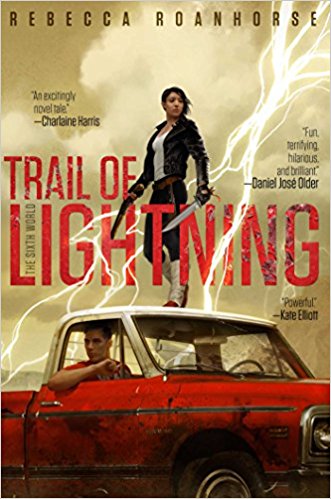 Trail of Lightning (The Sixth World, #1) by Rebecca Roanhorse
Trail of Lightning (The Sixth World, #1) by Rebecca Roanhorse Format: ebook
Source: purchased from Amazon
Formats available: hardcover, paperback, ebook, audiobook
Genres: post apocalyptic, urban fantasy
Series: Sixth World #1
Pages: 287
Published by Saga Press on June 26, 2018
Purchasing Info: Author's Website, Publisher's Website, Amazon, Barnes & Noble, Kobo, Bookshop.org
Goodreads
While most of the world has drowned beneath the sudden rising waters of a climate apocalypse, Dinétah (formerly the Navajo reservation) has been reborn. The gods and heroes of legend walk the land, but so do monsters.
Maggie Hoskie is a Dinétah monster hunter, a supernaturally gifted killer. When a small town needs help finding a missing girl, Maggie is their last—and best—hope. But what Maggie uncovers about the monster is much larger and more terrifying than anything she could imagine.
Maggie reluctantly enlists the aid of Kai Arviso, an unconventional medicine man, and together they travel to the rez to unravel clues from ancient legends, trade favors with tricksters, and battle dark witchcraft in a patchwork world of deteriorating technology.
As Maggie discovers the truth behind the disappearances, she will have to confront her past—if she wants to survive.
Welcome to the Sixth World.
My Review:
I’ve had Trail of Lightning in my “virtually towering TBR pile” for quite a while, but hadn’t gotten the round tuit necessary to actually give it the time it deserved. After three romances in a row, I just wasn’t in the mood for any more romance – and Trail of Lightning is on the recently announced Hugo Ballot for Best Novel. It just felt like the right time to get it out and finally get all the way into it.
And it was a WOW! Also exactly what I was in the mood for.
The story manages to be both part of the post-apocalyptic/urban fantasy tradition and fresh and new all at the same time. It’s also an exemplar of the idea that making sure that #ownvoices stories don’t merely get told but also get promoted and receive award nominations does not in any way detract from the quality of the genre.
Because this story is simply awesome. That it is told from a perspective we have not traditionally seen in genre does not make it any less part of the genre. It makes it better because the author knows whereof she speaks.
Trail of Lightning takes place in a post-apocalyptic world. The apocalypse in question is referred to as the “Big Water” – but it’s an apocalypse that we can see from here. At least in its more mundane aspects.
There’s a saying that nature bats last, and the “Big Water” is an example of nature taking that “at bat”, with a little help from at least some of the gods – and bringing back some of the monsters, along with magic.
The population of the world has been decimated, as Nature decided to bring all the consequences of global warming down all at once. All the low-lying coastal regions of all the countries around the world are gone.
But the powers-that-were in the Four Corners region, an area currently under the jurisdiction of the Navajo Nation, were prescient enough to erect massive border walls around their country, Dinétah. With the help of their Gods.
When the Big Water came, the Dinétah was safe behind its walls, at least from anything coming in from the outside. Not that there aren’t plenty of both human and other monsters inside Dinétah with them.
That’s where Maggie Hoskie comes in. Maggie is A monsterslayer, trained by THE Monsterslayer of legend, Neizghání. But her teacher has left her on her own, and left her with the dark sense that she is much too close to becoming one of the monsters herself.
The story of Trail of Lightning is Maggie’s journey out of the pit of despair she has dug herself into and back out into, if not the light, then back into a world that definitely needs her even if it doesn’t always want her.
Along the way, she’ll have to fight monsters, monsterslayers, and the monster inside herself. And she’ll have to get the best of the god who’s been playing her all along.
Escape Rating A: I loved this one. Not only is it an epic heroine’s journey, but the world created by the story is absolutely fascinating.
I want to say that Maggie is a likeable heroine, because that what we always say. But she isn’t really likeable much of the time. She is flawed, scarred, scared and relatable, but she’s extremely prickly, to put it mildly.
She doesn’t trust easily, and often when she does, she finds out later that she shouldn’t. She’s tough and no-nonsense on the outside, and broken on the inside. That some of the things that have broken her are literally monsters doesn’t make her any less relatable in her broken-ness.
We all get broken by monsters – even if those monsters wear a human face.
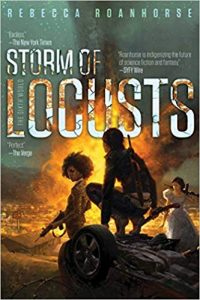 Elements of this story had echoes for me from other SF and fantasy that I have read. The post-flood US of American War, the Dinétah setting of the Leaphorn, Chee and Manuelito series, the monster-hunting, coming-into-her-power heroine of The Walker Papers, the many faces and tricks of Coyote from the Iron Druid Chronicles, and last but not least, the discovery of the trickster behind the entire plot from American Gods.
Elements of this story had echoes for me from other SF and fantasy that I have read. The post-flood US of American War, the Dinétah setting of the Leaphorn, Chee and Manuelito series, the monster-hunting, coming-into-her-power heroine of The Walker Papers, the many faces and tricks of Coyote from the Iron Druid Chronicles, and last but not least, the discovery of the trickster behind the entire plot from American Gods.
Those are all awesome antecedents in their own extremely different ways, and Trail of Lightning stands tall in their company. Tall enough to draw plenty of lightning.
This is the first post-apocalyptic weird west urban fantasy I’ve ever read – but it certainly won’t be the last. The second book in the Sixth World series, Storm of Locusts came out this week!

 Tangled Dreams: A Dream Weavers and Truth Seekers Book by
Tangled Dreams: A Dream Weavers and Truth Seekers Book by 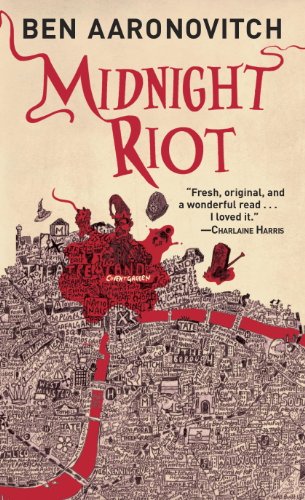 Midnight Riot (Peter Grant, #1) by
Midnight Riot (Peter Grant, #1) by 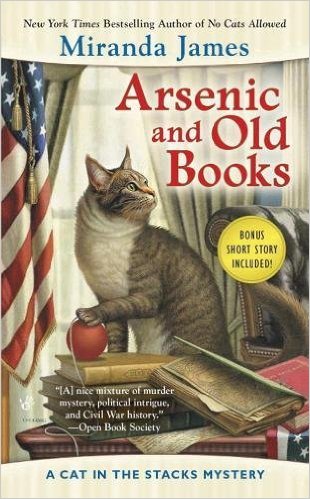 Arsenic and Old Books by
Arsenic and Old Books by 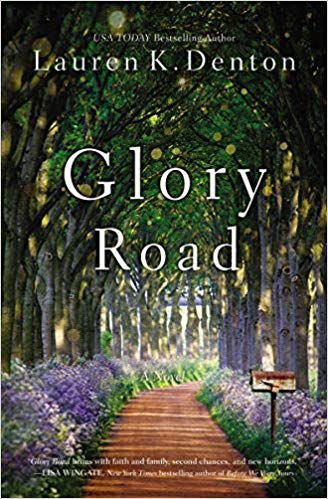 Glory Road by
Glory Road by 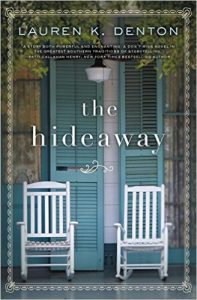 Escape Rating B+: This was, just like my reading of
Escape Rating B+: This was, just like my reading of 
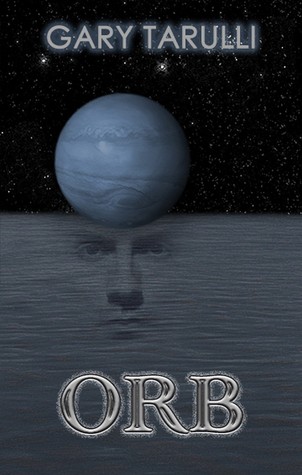 Orb by
Orb by 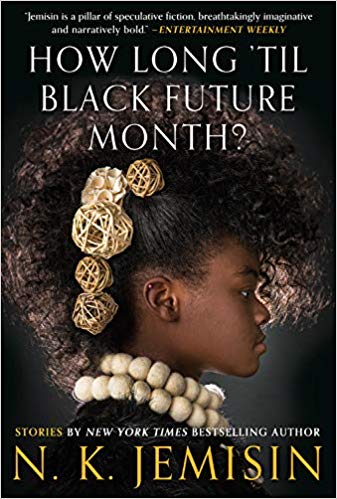 How Long 'til Black Future Month? by
How Long 'til Black Future Month? by 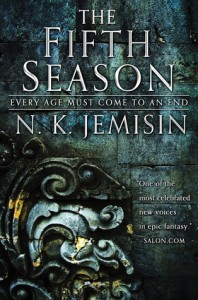 Personally speaking, I loved her
Personally speaking, I loved her 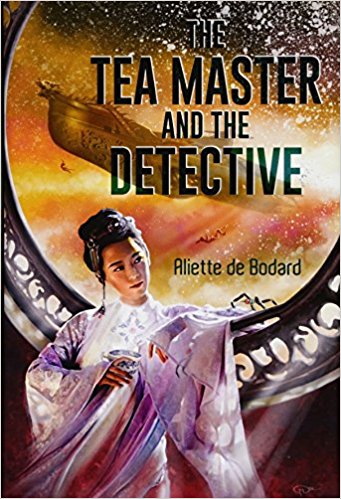 The Tea Master and the Detective (The Universe of Xuya) by
The Tea Master and the Detective (The Universe of Xuya) by 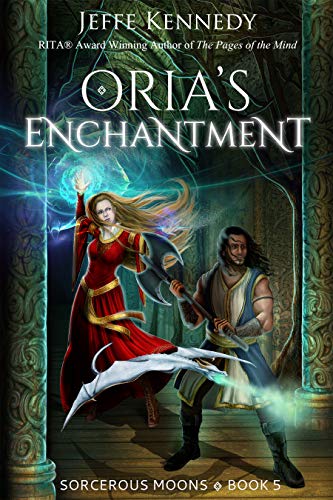 Oria's Enchantment by
Oria's Enchantment by 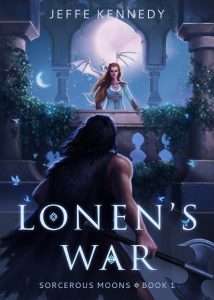 This series began back in
This series began back in 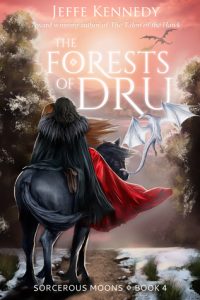 The part of the story that takes place in Oria’s Enchantment is a rise from the “waiting game” that occurred in the previous book in the series,
The part of the story that takes place in Oria’s Enchantment is a rise from the “waiting game” that occurred in the previous book in the series, 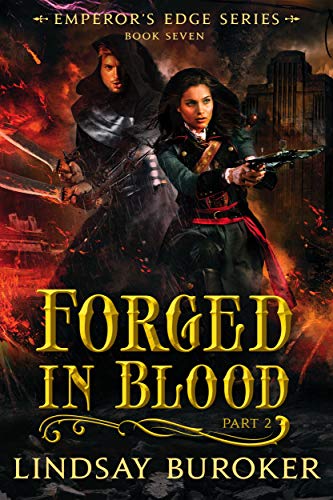 Forged in Blood II (The Emperor's Edge, #7) by
Forged in Blood II (The Emperor's Edge, #7) by 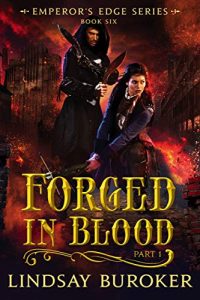 (Fair warning, this review will contain spoilers for Forged in Blood I. It would be equally impossible to talk at all about this book without talking about that book. They are pretty much one story, and everything that happens here is dependent on what happened there. Also, Captain Obvious being very obvious, don’t start the series here!)
(Fair warning, this review will contain spoilers for Forged in Blood I. It would be equally impossible to talk at all about this book without talking about that book. They are pretty much one story, and everything that happens here is dependent on what happened there. Also, Captain Obvious being very obvious, don’t start the series here!)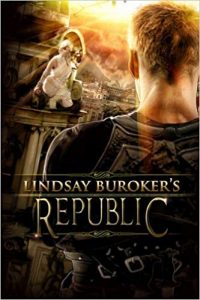 Realistically, it would not be possible for a series that had this much adventure – including misadventure, in it without a butcher’s bill to be paid by the company. That price that they paid felt right, proper and necessary – and provided a much needed bit of poignancy to the ending.
Realistically, it would not be possible for a series that had this much adventure – including misadventure, in it without a butcher’s bill to be paid by the company. That price that they paid felt right, proper and necessary – and provided a much needed bit of poignancy to the ending.